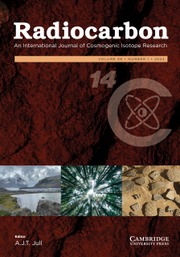Crossref Citations
This article has been cited by the following publications. This list is generated based on data provided by
Crossref.
Sanchez, William
Yanes, Yurena
Linstädter, Jörg
and
Hutterer, Rainer
2022.
Chronology, time averaging, and oxygen isotope composition of harvested marine mollusk assemblages from Ifri Oudadane, northeast Morocco.
Quaternary Research,
Vol. 106,
Issue. ,
p.
147.
Agiadi, Konstantina
Azzarone, Michele
Hua, Quan
Kaufman, Darrell S.
Thivaiou, Danae
and
Albano, Paolo G.
2022.
The taphonomic clock in fish otoliths.
Paleobiology,
Vol. 48,
Issue. 1,
p.
154.
Nawrot, Rafał
Berensmeier, Michaela
Gallmetzer, Ivo
Haselmair, Alexandra
Tomašových, Adam
and
Zuschin, Martin
2022.
Multiple phyla, one time resolution? Similar time averaging in benthic foraminifera, mollusk, echinoid, crustacean, and otolith fossil assemblages.
Geology,
Vol. 50,
Issue. 8,
p.
902.
Albano, PG
Sabbatini, A
Lattanzio, J
Päßler, JF
Steger, J
Hua, Q
Kaufman, DS
Szidat, S
Zuschin, M
and
Negri, A
2022.
Alleged Lessepsian foraminifera prove native and suggest Pleistocene range expansions into the Mediterranean Sea.
Marine Ecology Progress Series,
Vol. 700,
Issue. ,
p.
65.
Steger, Jan
Bošnjak, Marija
Belmaker, Jonathan
Galil, Bella S.
Zuschin, Martin
and
Albano, Paolo G.
2022.
Non‐indigenous molluscs in the Eastern Mediterranean have distinct traits and cannot replace historic ecosystem functioning.
Global Ecology and Biogeography,
Vol. 31,
Issue. 1,
p.
89.
DO NASCIMENTO RITTER, MATIAS
ERTHAL, FERNANDO
KOSNIK, MATTHEW A.
KOWALEWSKI, MICHAŁ
COIMBRA, JOÃO CARLOS
CARON, FELIPE
and
KAUFMAN, DARRELL S.
2023.
ONSHORE-OFFSHORE TRENDS IN THE TEMPORAL RESOLUTION OF MOLLUSCAN DEATH ASSEMBLAGES: HOW AGE-FREQUENCY DISTRIBUTIONS REVEAL QUATERNARY SEA-LEVEL HISTORY.
Palaios,
Vol. 38,
Issue. 3,
p.
148.
Leonhard, Isabella
and
Agiadi, Konstantina
2023.
Addressing challenges in marine conservation with fish otoliths and their death assemblages.
Geological Society, London, Special Publications,
Vol. 529,
Issue. 1,
p.
243.
Kowalewski, Michał
Nawrot, Rafał
Scarponi, Daniele
Tomašových, Adam
and
Zuschin, Martin
2023.
Marine conservation palaeobiology: What does the late Quaternary fossil record tell us about modern-day extinctions and biodiversity threats?.
Cambridge Prisms: Extinction,
Vol. 1,
Issue. ,
Tomašových, Adam
Dominici, Stefano
Nawrot, Rafał
and
Zuschin, Martin
2023.
Temporal scales, sampling designs and age distributions in marine conservation palaeobiology.
Geological Society, London, Special Publications,
Vol. 529,
Issue. 1,
p.
1.
Albano, Paolo G.
Hua, Quan
Kaufman, Darrell S.
and
Zuschin, Martin
2023.
Young death assemblages with limited time-averaging in rocky and
Posidonia oceanica
habitats in the Mediterranean Sea
.
Geological Society, London, Special Publications,
Vol. 529,
Issue. 1,
p.
41.
Durham, Stephen R.
Dietl, Gregory P.
Hua, Quan
Handley, John C.
Kaufman, Darrell
and
Clark, Cheryl P.
2023.
Age variability and decadal time-averaging in oyster reef death assemblages.
Geology,
Vol. 51,
Issue. 11,
p.
1067.
Tomašových, Adam
García-Ramos, Diego A.
Nawrot, Rafał
Nebelsick, James H.
and
Zuschin, Martin
2023.
Millennial-scale changes in abundance of brachiopods in bathyal environments detected by postmortem age distributions in death assemblage (Bari Canyon, Adriatic Sea).
Geological Society, London, Special Publications,
Vol. 529,
Issue. 1,
p.
153.
Nield, Catherine B.
Yanes, Yurena
Reuther, Joshua D.
Muhs, Daniel R.
Pigati, Jeffrey S.
Miller, Joshua H.
and
Druckenmiller, Patrick S.
2024.
Late glacial–Younger Dryas climate in interior Alaska as inferred from the isotope values of land snail shells.
Quaternary Research,
Vol. 117,
Issue. ,
p.
119.
Bright, Jordon
Ebert, Chris
Flores, Carola
Harnik, Paul G
Huntley, John Warren
Kowalewski, Michał
Portell, Roger W
Retelle, Michael
Schuur, Edward A G
and
Kaufman, Darrell S
2024.
Comparing MICADAS Gas Source, Direct Carbonate, and Standard Graphite 14C Determinations of Biogenic Carbonate.
Radiocarbon,
Vol. 66,
Issue. 2,
p.
295.



